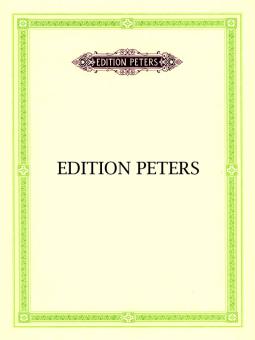John Cage
4'33'
Tacet (Centennial Edition)
John Cage
4'33'
Tacet (Centennial Edition)
- Compositor John Cage
- Editorial Edition Peters
- Nº de pedido EP6777C
IVA incluido.,
Más gastos de envío
No disponible en todos los países. Leer más
Descripción de la:
A special edition to mark John Cages 100th birthday, including all published editions of 4'33' - both the typed and calligraphic TACET versions, as well as the proportional notation created for Irwin Kremen, to whom Cage had dedicated this silent piece.
Premiered in 1952, the piece has excited controversy and debate ever since.
The premiere of the three-movement 4'33' was given by David Tudor on August 29, 1952, at Woodstock, New York as part of a recital of contemporary piano music. The audience saw him sit at the piano and, to mark the beginning of the piece, close the keyboard lid. Some time later he opened it briefly, to mark the end of the first movement. This process was repeated for the second and third movements. The piece had passed without a note being played-in fact without Tudor (or anyone else) having made any deliberate sound as part of the piece. Tudor timed the three movements with a stopwatch while turning the pages of the score.
They missed the point. There's no such thing as silence. What they thought was silence, because they didn't know how to listen, was full of accidental sounds. You could hear the wind stirring outside during the first movement. During the second, raindrops began patterning the roof, and during the third the people themselves made all kinds of interesting sounds as they talked or walked out.
John Cage speaking about the premiere of 4'33.
This synoptic Centenial Edition brings together all previously published editions: the three previously published versions (a version in proportional notation, and the two 'tacet' versions) together with a reconstruction of the original (and now lost) manuscript by David Tudor. The edition is completed by the reproduction of a letter about the piece from John Cage to Helen Wolff.
Premiered in 1952, the piece has excited controversy and debate ever since.
The premiere of the three-movement 4'33' was given by David Tudor on August 29, 1952, at Woodstock, New York as part of a recital of contemporary piano music. The audience saw him sit at the piano and, to mark the beginning of the piece, close the keyboard lid. Some time later he opened it briefly, to mark the end of the first movement. This process was repeated for the second and third movements. The piece had passed without a note being played-in fact without Tudor (or anyone else) having made any deliberate sound as part of the piece. Tudor timed the three movements with a stopwatch while turning the pages of the score.
They missed the point. There's no such thing as silence. What they thought was silence, because they didn't know how to listen, was full of accidental sounds. You could hear the wind stirring outside during the first movement. During the second, raindrops began patterning the roof, and during the third the people themselves made all kinds of interesting sounds as they talked or walked out.
John Cage speaking about the premiere of 4'33.
This synoptic Centenial Edition brings together all previously published editions: the three previously published versions (a version in proportional notation, and the two 'tacet' versions) together with a reconstruction of the original (and now lost) manuscript by David Tudor. The edition is completed by the reproduction of a letter about the piece from John Cage to Helen Wolff.

